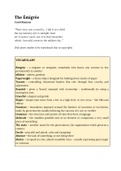The Émigrée
Carol Rumens
“There once was a country… I left it as a child
but my memory of it is sunlight-clear
for it seems I never saw it in that November
which, I am told, comes to the mildest city…”
(Full poem unable to be reproduced due to copyright)
VOCABULARY
Émigrée - a migrant or emigrant, somebody who leaves one country to live
permanently in another
Mildest - softest, gentlest
Paperweight - a heavy object designed for holding down stacks of paper
Tyrants - controlling, dictatorial leaders that rule through fear, cruelty, and
oppression
Branded - given a ‘brand’, stamped with ownership - traditionally by using a
searing hot iron
Graceful - elegant and gentle
Slopes - shapes that move from a low to a high level, or vice versa - like hills and
valleys
Frontiers - boundaries imposed around the borders of countries or territories,
made by governments usually following the success of a war or conflict
Grammar - the structure and system of rules that form a language
Molecule - the smallest possible unit of an element or compound, a very small
piece of something
The state - another name for the government, the organisation which governs a
country
Docile - peaceful and placid, calm and easygoing
Absence - the lack of something, or not being there
Mutter - to speak in a low, almost inaudible voice - usually expressing quiet anger
or criticism
, STORY/SUMMARY
There once was a country… I left it when I was a child, but my memory of it is as
clear as sunlight because it seems that I never saw it in that November (Winter
time, cold and dark times) which, I’m told, comes to even the calmest city. The
worst news I hear of my country cannot break my original memory, the bright,
filled paperweight. The country may be at war now, it may be sick with tyrants, but
I am marked by an impression of sunlight that I remember as a child, and nothing
can change that now.
I remember the white streets of that city, its elegant slopes glow even clearer as
time progresses, rolling out its tanks, and the barriers and borders rise between us,
closing like waves. The child’s language that I carried here to this new land is like a
hollow doll, it spills open, spilling out grammar. Soon I will have every colourful
piece of language. My original memory of my country may now be a lie, banned by
the government, but I can’t get it off my tongue. It tastes of sunlight.
I have no passport, there’s no way back at all but instead of me returning, my city
comes to me on its own white plane. It lies down in front of me, peaceful and calm
as paper; I comb its hair and love its shining eyes. My city takes me dancing
through the city of walls that I live in now. The people of this city accuse me of
absence, they circle around me. They accuse me of being dark in their free city.
They mutter that they want me to die, and my shadow falls behind me as evidence
of sunlight.
SPEAKER/VOICE
The poem uses a first-person narrative voice with the first person singular
pronoun ‘I’ and the possessive pronoun ‘my’, showing that the speaker is the
émigrée mentioned in the title. The use of a double ‘ee’ at the end of this word
suggests that this persona is female, as it is written with the French feminine
ending. However, the persona is not Rumens (the poet) herself, instead, she is
speaking in character using a dramatic monologue to talk from the perspective of
a person who has been dislocated from their homeland. She uses naturalistic





